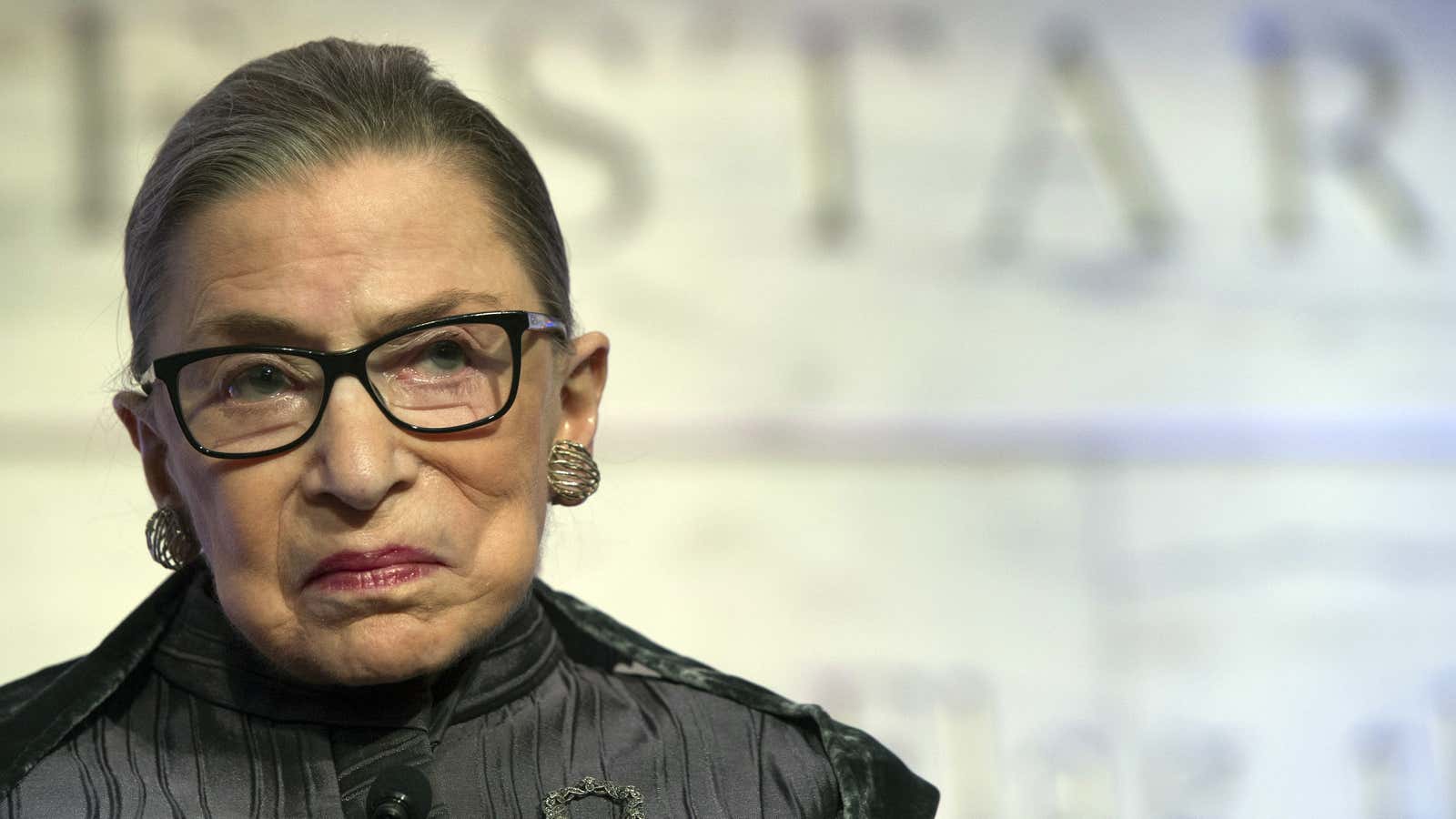The Notorious RBG—as US Supreme Court Justice Ruth Bader Ginsburg is known to her many fans—has a tough gig. Not only does she have to decide the nation’s most contentious cases along with her eight colleagues on the bench, she must contend with constant speculation about her death.
It doesn’t worry her too much, however. At 86 years old, Ginsburg has survived three bouts of cancer and is still laughing. “There was a senator, I think it was after my pancreatic cancer, who announced, with great glee, that I was going to be dead within six months. That senator, whose name I have forgotten, is now dead himself, and I,” the justice told NPR in a new interview, “am very much alive.”
Ginsburg has no intention of retiring anytime soon. Indeed, she believes her work has kept her going. The justice is known to review briefs from her hospital bed. “The work is really what saved me, because I had to concentrate on reading the briefs, doing a draft of an opinion, and I knew it had to get done. So I had to get past whatever my aches and pains were just to do the job.”
Her tenacity has yielded criticism from both the right and the left. While Republicans may wish she was dead, some Democrats have said that she should have retired when Barack Obama was president to ensure that she couldn’t be replaced by a conservative justice. But she is committed to sticking it out as long as she can and she recently got support for this position from a source whose advice has since become all the more poignant.
Ginsburg saw the late justice John Paul Stevens at a conference in Lisbon the week before he died at 99 years old, on July 16. When she told him her dream is to serve on the court as long as he did—Stevens served for 35 years from 1975 to 2010—he urged her to “stay longer,” Ginsburg said in her eulogy to the late justice, delivered at his funeral on July 23.
As for concerns about conservative presidents packing the court with her alleged ideological enemies, Ginsburg minimizes the political friction on the bench. Like her boss, the chief justice John Roberts, she insists that theirs is not a partisan political institution.
In her interview with NPR, Ginsburg noted that the current justices work well together, despite some strong disagreement regarding specific issues. She might prefer if the court was less conservative but has always insisted that collegiality is key to fulfilling the court’s important mission and appears to have no personal problems with US president Donald Trump’s appointees, Brett Kavanaugh and Neil Gorsuch. They served as high court clerks when they were young lawyers and she was in her early years as a justice so they are known quantities to her, she points out. This term she assigned them important opinions to write in cases where she was the senior justice in the majority and Roberts—who as chief assigns the opinions when he’s in the majority—dissented.
This point about nonpartisanship was emphasized in her eulogy to Stevens, who was appointed by Republican president Gerald Ford but whose service became known for his dedication to the law above all else. “I am among legions of lawyers and judges who would concur heartily in President Ford’s praise for the ‘dignity, intellect, and [absence of] partisan political concerns’ that marked Justice Stevens’ service on the Court, and to the country,” Ginsburg said.
If Ginsburg has her way, her own eulogy will not be written for many, many years. She cites opera singer Marilyn Horne, who said after being diagnosed with pancreatic cancer in 2005, “I will live.” The justice points out to NPR that Horne didn’t just hope or desire survival but insisted upon it. And Ginsburg is doing the same.
